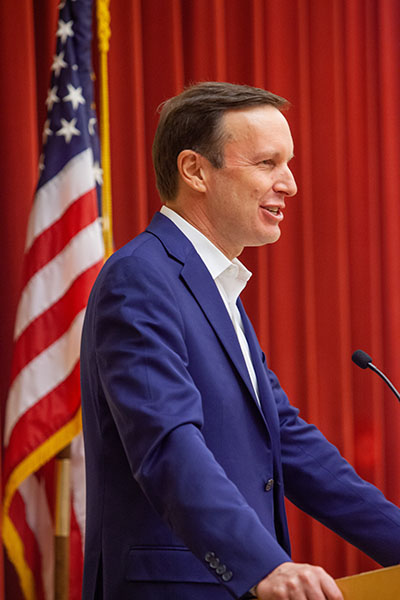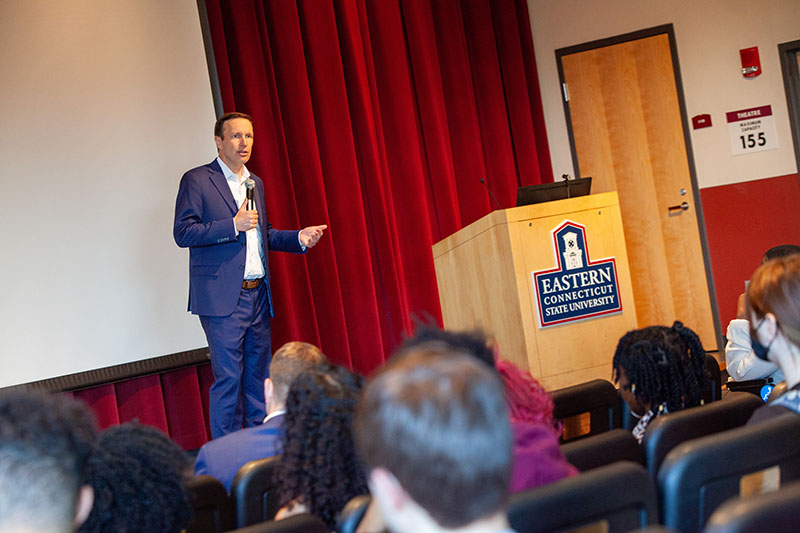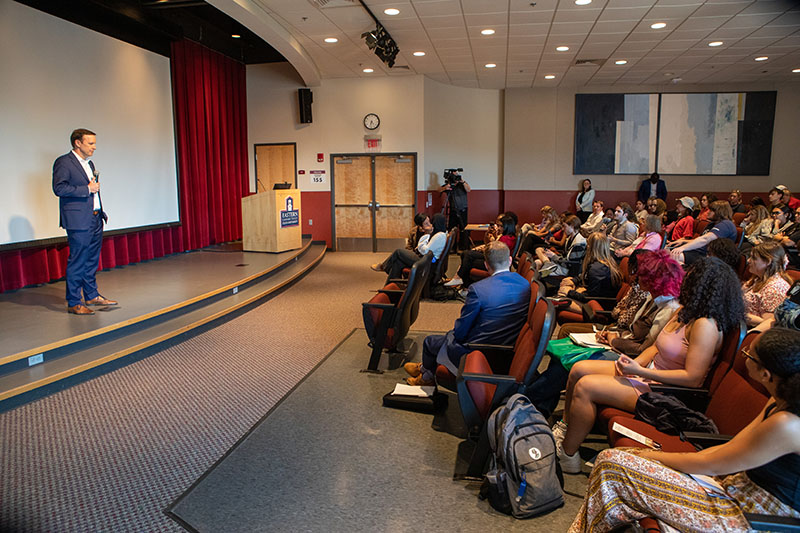- Apply
- Visit
- Request Info
- Give
Published on April 26, 2023
Senator Chris Murphy addresses students’ concerns
U.S. Senator Chris Murphy fielded questions ranging from gun violence to foreign policy at an open forum on April 12 sponsored by the Political Science Club and the Department of Political Science, Philosophy and Geography at Eastern Connecticut State University.
“I want to say very little at the outset, because I believe our time here today will be more productive if you (the people in attendance) steered the conversation toward the issues and the concerns that you have,” Murphy said. “This is supposed to be a dialogue, not a lecture.”
During the Q & A session, attendees’ questions covered various topics, including gun violence, LGBTQ+ rights, foreign policy and the youth’s potential influence to incite fundamental changes for the betterment of future generations.
Murphy responded by promising that he would personally assume more responsibility and accountability while exerting additional effort to rectify the issue at hand.

To help eradicate discrimination among LGBTQ students, Murphy said he plans to continue pushing for equity and equality in the law by proposing in Congress the Broader Equity Act and the Student Equality Act.
On the other hand, he urged caution on how intensely and frequently the U.S. sanctions foreign trading partners during the current conflicts with Russia and China, warning that the U.S. dollar may be dethroned by the Chinese Yen as the global currency if sanctions against other countries are too routine.
In response to a gun violence-related question, he reassured attendees that he has been promoting “Red Flag” laws and more stringent background checks for gun purchasers under the age of 21.
The most crucial theme Murphy brought up was the notion that young people have the inherent power to affect changes within their communities.
“What I discovered as a 17- or 18-year-old was that I had this enormous power as a young person to change the world,” Murphy said. “And I now know, as somebody who organizes around issues that I care about, and the state cares about, that the only way to get anything done is to have young people at the forefront of your movement.”
As an example, Senator Murphy cited recent developments that have taken place within the climate change and gun violence movements, which had been stagnant for the past 30 years before activists in the younger generations, like climate activist Greta Thunberg and Tennessee legislators Justin Jones and Justin Pearson, asserted themselves as leaders.
“I rely on all of you to step up and provide all of the practical and moral leadership that’s necessary,” Murphy said, “But, I’ll tell you, I think we’re seeing paradigm shifts on a lot of major issues, but particularly guns and climate … I don’t think we’re going to lose; we’re going to win more regularly.”
“Forums like this enable us to tell our elected representatives what we are thinking,” said Eastern President Elsa Núñez. “Forums such as this, conducted with civility and respect, are fundamental to our great American democracy and I’m so pleased we all had the opportunity to participate.”
“One of (Senator Murphy’s) hallmarks, and one of the marks of his future legacy, is that he is considered a bipartisan worker, who works across the aisle,” President Núñez said. “It is a special, special quality that he has.”
The event was organized by the Political Science Club, which is working to bring speakers involved in current events to campus to discuss relevant topics. The club's officers include N'Deiye Tall, Grace Carlos, Maheen Khan and Enumaah Dadzie, who worked with lecturer Benjamin Akwei on scheduling Sen. Murphy's talk.



